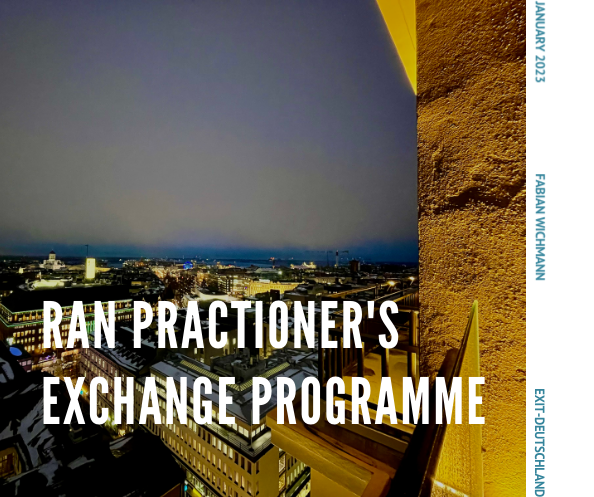Study Visit to Finland
Report by Fabian Wichmann.
The RAN Practitioner Exchange Programme, which took place among others in Germany (EXIT-Germany) and Finland (Kare Ry & Exit Finland), was a resounding success in supporting and targeting practitioners at an individual professional level. This pioneering programme was a new deliverable for RAN and it provided practitioners with the unparalleled opportunity of a „shadowing“ and learning experience. The concept behind the programme is that visiting practitioners and hosting practitioners can learn from each other in a more intimate and personalized setting than traditional RAN working group meetings or training seminars.
„It’s easy to learn something but moreimportant to experience what to learn.“
The RAN PEP was a chance for practitioners to gain new insights, knowledge, and skills in a different country and context. The exchange allowed practitioners to see how their counterparts work and to learn from their experiences. It was a chance for practitioners to step out of their comfort zones and gain new perspectives on the challenges they face in their daily work.
The exchange was extremely beneficial and very helpful, impressive, and meaningful. It was the opportunity to observe our counterparts working in real-life situations and to learn from them firsthand with chance to share own experiences and knowledge with our counterparts, which was mutually beneficial. The Practitioner Exchange Programme was a valuable addition to RAN’s efforts to support practitioners and improve skills and knowledge. It was a unique opportunity to learn from each other, share best practices, and gain new perspectives in the field of P/CVE. The following report is intended to give a small insight.
Summary
The practitioner exchange program was a 5-day program focusing on exchanging knowledge and participative experience in the context of exit work and deradicalization. The 5-day exchange program in Finland where divided in 2 parts. 3 days in Lapland to learn about deradicalization, exit work and specific techniques of art therapy and life coaching in an extreme environment. The program was implemented in the Arctic environment of Lapland, where some exercises took place in the rough nature. The program focused on possible transfers of these practices into exit work, as well as the exploration of whether these approaches could also be implemented for clients as an experiential space. The second part of the exchange was implemented with the colleagues from Exit Finland in Helsinki, where he gained an intensive insight into the approach and work of Exit Finland and discussed questions of targeting as well as different prerequisites and practices. The key learnings from the program were the use of art therapy as a low-threshold technique to develop trust between client and counsellor and the use of an extreme environment to discuss extreme issues in exit work.


